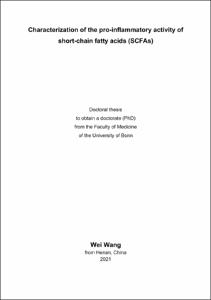Characterization of the pro-inflammatory activity of short-chain fatty acids (SCFAs)

Characterization of the pro-inflammatory activity of short-chain fatty acids (SCFAs)

| dc.contributor.advisor | Latz, Eicke | |
| dc.contributor.author | Wang, Wei | |
| dc.date.accessioned | 2021-10-13T13:17:19Z | |
| dc.date.available | 2023-11-01T23:00:12Z | |
| dc.date.issued | 13.10.2021 | |
| dc.identifier.uri | https://hdl.handle.net/20.500.11811/9357 | |
| dc.description.abstract | Short-chain fatty acids (SCFAs), which are mainly derived from microbial fermentation of dietary fibres, have been considered to be beneficial to gut health for decades. Recently, a few of studies reported that some patients with inflammatory bowel disease (IBD) showed poor tolerance to diets rich in certain fibres, and that fibre fermentation-derived SCFAs could exacerbate gut inflammation in mouse colitis models. Therefore, intensive efforts are required to further define and characterize the roles of SCFAs under inflammatory state.
Given the mobility (translocation) of microbiota-derived metabolites and recruitment of phagocytes, such as macrophages, in a leaky gut under inflammatory conditions in patients with IBD, I challenged primary human macrophages with the combinations of SCFAs and the TLR-4 agonist LPS. Transcriptomics and proteomics profiling, and measurement of cytokines secretion were performed, which, interestingly, showed that the SCFA butyrate displayed the strongest regulatory effect on the TLR-4-induced genes transcription and translation as well as cytokines production. Furthermore, I found that butyrate could aggravate inflammatory responses by enhancing the TLR-induced pro-inflammatory cytokine interleukin (IL) -1β and suppressing the anti-inflammatory cytokine IL-10. This was in contrast to the previously reported anti-inflammatory and protective roles of butyrate in intestinal epithelial cells (IECs). In further experiments, working on the mechanisms by which butyrate regulates TLR-mediated IL-1β and IL-10 production, I discovered that butyrate, together with LPS, induced IL-1β secretion in an NLRP3 inflammasome-dependent manner, with the engagement of multiple molecules including caspase-8, TBK-1, RIPK1, RIPK3, STAT3 and HDAC11. On the other hand, butyrate strongly inhibited TLR-induced IL-10 signaling with the involvement of STAT1, STAT3, p38 and the Akt-mTOR pathway. In my thesis, I characterized the effect of SCFAs on the TLR-mediated transcriptional and proteomic responses. Importantly, I showed that SCFAs might be detrimental to gut health in the patients with IBD through regulations of the cytokines IL-1β and IL-10 in primary human macrophages. I also identified a network of biomolecules engaged in these processes. These findings provide new evidences for a full understanding of how SCFAs impact on gut health and suggest potential novel targets for the treatment of patients with IBD. | en |
| dc.language.iso | eng | |
| dc.rights | In Copyright | |
| dc.rights.uri | http://rightsstatements.org/vocab/InC/1.0/ | |
| dc.subject | Short-chain fatty acids | |
| dc.subject | IBD | |
| dc.subject | NLRP3 inflammasome | |
| dc.subject.ddc | 570 Biowissenschaften, Biologie | |
| dc.subject.ddc | 610 Medizin, Gesundheit | |
| dc.title | Characterization of the pro-inflammatory activity of short-chain fatty acids (SCFAs) | |
| dc.type | Dissertation oder Habilitation | |
| dc.publisher.name | Universitäts- und Landesbibliothek Bonn | |
| dc.publisher.location | Bonn | |
| dc.rights.accessRights | openAccess | |
| dc.identifier.urn | https://nbn-resolving.org/urn:nbn:de:hbz:5-64122 | |
| ulbbn.pubtype | Erstveröffentlichung | |
| ulbbnediss.affiliation.name | Rheinische Friedrich-Wilhelms-Universität Bonn | |
| ulbbnediss.affiliation.location | Bonn | |
| ulbbnediss.thesis.level | Dissertation | |
| ulbbnediss.dissID | 6412 | |
| ulbbnediss.date.accepted | 18.10.2021 | |
| ulbbnediss.institute | Medizinische Fakultät / Institute : Institut für Angeborene Immunität | |
| ulbbnediss.fakultaet | Medizinische Fakultät | |
| dc.contributor.coReferee | Schultze, Joachim | |
| ulbbnediss.date.embargoEndDate | 01.11.2023 | |
| ulbbnediss.contributor.gnd | 1250029430 |
Files in this item
This item appears in the following Collection(s)
-
E-Dissertationen (1939)




